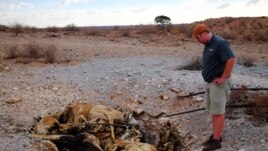12 January 2020
Extreme drought is threatening South Africa's wildlife industry. Farmers are keeping fewer animals and vacationers are visiting in smaller numbers.
Parts of the country have been affected by repeated years of hotter than normal weather and below average rainfall. The conditions have burned feeding grasses and dried up watering holes. In 2015, the area saw the driest year on record.
The agency Wildlife Ranching South Africa (WRSA) collects data on more than 9,000 wildlife ranches in the nation. It estimates that the Northern Cape province has lost more than two-thirds of its game over the last three years. WRSA is talking to ranchers around the country to gather information on animal loss and the financial impact the drought is having.
WRSA chief Adri Kitshoff-Botha told Reuters News Agency the drought has continued for some time. "In some areas we've seen it has been going now for six years," she said.

Farm manager Burger Schoeman stands over a pit of dead animals near Groblershoop, South Africa, December 6, 2019.
The wildlife industry brings money to South Africa's economy through tourism, hunting, breeding and meat production. Trophy hunting – the shooting of carefully chosen animals – made $140 million in 2016. That information comes from research by the environment ministry.
The Intergovernmental Panel on Climate Change notes Southern Africa's temperatures are rising at two times the world's average rate. And in much of South Africa, the level of water in manmade lakes is decreasing.
Burger Schoeman supervises the Thuru Lodge in the Northern Cape. There, the dying plants and dry grounds are a serious concern.
In the past, the lodge was home to around 4,500 wild animals – including 35 different species, from antelope to rhino. But it has lost around 1,000 animals because of the drought. Now, dead animals sit in old, unused mines on the edge of the property.
Schoeman told reporters from the Reuters news agency, "At this stage we are quite stretched. All the money you get from selling the animals, the meat and all of that, gets put straight back into the property to look after the rest of the animals."
The lodge has seen its spending rise as it buys more feed for the animals. At the same time, hunters are paying less, and fewer tourists are visiting because the animals are in poor condition.
At the 48,000-hectare Karreekloof Safari Lodge in the same province, game rangers find dead animals every week.
Gideon Watts is the ranch supervisor there. "Nobody wants to buy the game, because they also (are experiencing) ... the same drought," he said. He added that his farm got only one-fourth of its usual rainfall this year.
The industry has seen a decrease of around 20 percent in tourists over the past year, said WRSA's Kitshoff-Botha.
The drought has also hit other parts of Southern Africa. In Botswana, more than 100 elephants died in two months in 2019. Botswana is home to almost one-third of Africa's elephants.
I'm Alice Bryant.
Tanisha Heiberg reported this story for Reuters News Agency. Alice Bryant adapted it for Learning English. Kelly Jean Kelly was the editor.
_______________________________________________________________
Words in This Story
ranch – n. a large farm where animals are raised
province – n. any of the large parts that some countries are divided into
game – n. animals that are hunted
tourism – n. the activity of traveling to a place for pleasure
breeding – n. the process by which young animals are produced by their parents
species – n. a group of animals or plants that are similar and can produce young animals or plants
ranger – n. a person in charge of managing and protecting part of a national park or wildlife lodge